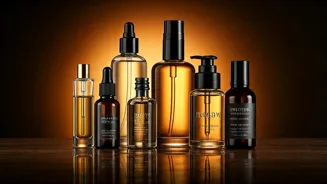Introduction: The Power
Hair oils have been a cornerstone of beauty rituals across cultures for centuries, and for good reason. They possess the remarkable ability to penetrate
the hair shaft, delivering essential nutrients and moisture. This deep nourishment is vital for promoting healthy hair growth. By selecting the right oils, you can address various hair concerns, from dryness and damage to stimulating the scalp. The application of hair oils improves blood circulation in the scalp. This enhanced blood flow is crucial as it carries vital nutrients to the hair follicles, which, in turn, fosters healthy and robust hair development. Regularly using hair oil can also protect your hair from environmental stressors like sun and pollution.
Coconut Oil's Reign
Coconut oil frequently tops the list of effective hair oils due to its unique composition, which allows it to penetrate the hair shaft deeply. It is rich in fatty acids, particularly lauric acid, which reduces protein loss, making hair stronger and less prone to breakage. Coconut oil also acts as a natural conditioner, hydrating the hair and giving it a lustrous shine. Regular use can also aid in minimizing split ends and combating dryness, leaving hair feeling soft and manageable. Furthermore, coconut oil's natural antifungal properties can assist in maintaining a healthy scalp environment, thereby promoting optimal hair growth and overall hair health. For the best results, warm the oil slightly before applying it to your hair.
Argan Oil's Benefits
Argan oil, often hailed as 'liquid gold,' is extracted from the argan tree nuts in Morocco. It is packed with essential fatty acids, antioxidants, and vitamin E, which work synergistically to repair and revitalize damaged hair. This oil is incredibly effective at smoothing the hair cuticle, reducing frizz, and adding shine. Its lightweight texture makes it suitable for all hair types, from fine to thick. Argan oil helps protect hair from heat styling and environmental damage. Regular application can significantly improve hair's elasticity and reduce breakage. Incorporating argan oil into your hair care routine is a simple yet powerful way to achieve healthier, more resilient hair.
Jojoba Oil Advantages
Jojoba oil is unique because it closely resembles the natural sebum produced by the scalp, making it an excellent choice for balancing oil production. It is easily absorbed, moisturizing the hair without leaving a greasy residue. Jojoba oil is rich in vitamins and minerals like vitamin E, vitamin B, and zinc, all vital for hair health. These nutrients contribute to strengthening hair follicles, reducing hair loss, and promoting growth. Its ability to unclog hair follicles can create a cleaner, healthier environment for hair growth. The versatility of jojoba oil makes it suitable for all hair types, helping to keep the scalp moisturized and the hair looking vibrant.
Castor Oil for Growth
Castor oil is well-known for its strong hair growth-promoting properties. This is due to its high concentration of ricinoleic acid, which stimulates blood circulation in the scalp, thereby encouraging hair growth. Castor oil deeply moisturizes the hair shaft, preventing dryness and breakage. Regular use can make hair thicker and stronger. It is essential to note that castor oil has a thicker consistency than other oils; therefore, it's often mixed with lighter oils like coconut or almond oil to facilitate application. While some people experience remarkable growth with castor oil, others may find it too heavy, so patch testing is advisable before incorporating it fully into your routine. Patience and consistency are key to achieving the desired results.
Almond Oil's Versatility
Almond oil is an excellent all-around hair oil, known for its ability to improve hair strength and shine. Rich in vitamin E, fatty acids, and antioxidants, almond oil nourishes the scalp and hair, promoting healthy hair growth. It’s a lightweight oil, making it perfect for all hair types, especially those with fine or thin hair. Almond oil helps reduce hair breakage and split ends, improving overall hair texture and manageability. Regular use helps to moisturize the scalp and hair, reducing dryness and promoting a healthy, balanced environment for hair development. It is easily absorbed and leaves no greasy residue, providing a natural shine and promoting a healthy scalp.
Olive Oil's Nourishment
Olive oil is a staple in many households because of its nourishing properties for hair. It is packed with antioxidants and healthy fats, which help strengthen the hair and protect it from damage. Olive oil has moisturizing properties, which help to soften the hair and give it a healthy shine. It can reduce frizz and make hair more manageable. Olive oil is particularly beneficial for dry and damaged hair, helping to restore moisture and improve elasticity. Regular use can help protect the hair from environmental damage, such as the sun and pollutants, promoting overall hair health. It is often recommended to use extra virgin olive oil for optimal results.
Tea Tree Oil's Benefits
Tea tree oil is valued for its antibacterial and antifungal properties, making it an excellent choice for treating scalp issues. It can help alleviate dandruff, itchiness, and other scalp conditions that can hinder hair growth. Tea tree oil helps to unclog hair follicles and promotes a healthier scalp environment. This environment is crucial for encouraging hair growth. It should be diluted with a carrier oil, such as coconut or jojoba oil, before application, due to its potency. Regular, diluted use can contribute to healthier hair by addressing underlying scalp problems. Its properties can help prevent build-up, which can block hair follicles and prevent healthy growth. Always perform a patch test to check for allergic reactions.
Rosemary Oil Magic
Rosemary oil has gained popularity for its ability to stimulate hair growth and prevent hair loss. It improves blood circulation to the scalp, which nourishes hair follicles and encourages hair growth. Rosemary oil also has anti-inflammatory properties that can soothe the scalp and reduce irritation, promoting a healthier environment for hair growth. It is often mixed with a carrier oil, like coconut or almond oil, before application due to its concentrated nature. Regular use may also help with premature graying and improve overall hair health. Some studies show rosemary oil might be as effective as minoxidil (Rogaine) in promoting hair growth.
Lavender Oil's Calm
Lavender oil is renowned for its calming and therapeutic benefits, extending to hair care. It is known to help increase blood circulation to the scalp, which promotes hair growth and reduces hair loss. Its properties help to soothe and calm the scalp, creating a balanced environment for healthy hair. Lavender oil may also possess antimicrobial properties, contributing to a healthier scalp. It is best mixed with a carrier oil, like jojoba or almond oil, before application. The calming properties of lavender oil are beneficial in reducing stress, which can indirectly affect hair health. Incorporating lavender oil into your hair care routine is a way to both promote hair health and enjoy its relaxing scent.





















